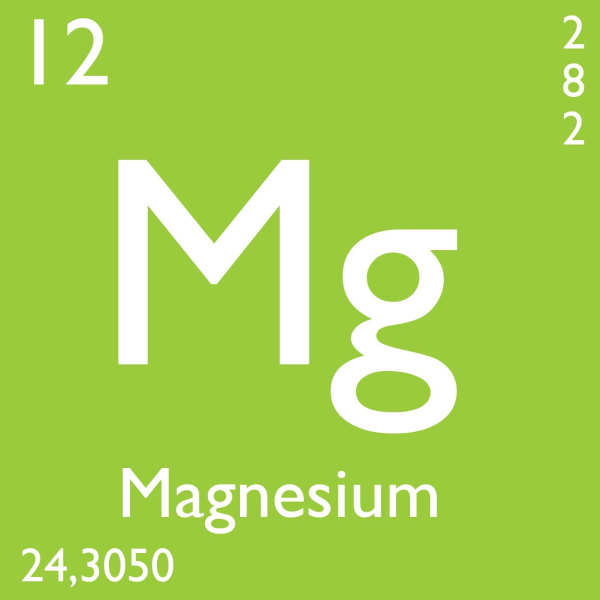What is Magnesium?

Magnesium is a chemical element, an alkaline earth metal that looks like a shiny silvery-white solid. It’s a strong metal and has almost the same density as aluminum which means that it’s strong but lightweight. It is the ninth most abundant element in the universe, eighth most abundant element in the Earth’s crust and eleventh most abundant in human body by weight!
Magnesium Health Benefits

Magnesium is an essential mineral that is found in your body, it’s also present in many foods. Did you know that magnesium is found in over 300 enzymes in your body? It is essential for all those hundreds of enzymes in your body to function properly and many of them involve energy metabolism.
Magnesium supports energy production in your body by activating adenosine triphosphate (ATP) that helps fight fatigue. The mineral is present in all cells in all living organisms – pretty cool, huh?
Magnesium is critically important for the normal functioning of cells, nerves, muscles, bones and your heart. It is used to relax your mind and body, and to promote a good night’s sleep. And we all know that getting proper sleep is one of the most important things you can do to your health. Since Magnesium has a relaxing effect, it can even help with digestion. Plus, it relieves muscle aches and spasms.
Why Is Magnesium Deficiency a Thing?
Some studies have shown that less than 60% of adults in the United States get an adequate amount of Magnesium in their diet. Keep in mind that an adequate amount is not the Recommended Dietary Allowance (RDA) of magnesium. It is thought that less than 30% of adults in the United States consume the Recommended Daily Allowance of magnesium. (Source) It looks like magnesium deficiency really is a thing!
The Recommended Dietary Allowances for Magnesium are: (Source)
| Age | Male | Female | Pregnancy | Lactation |
| Birth to 6 months | 30 mg* | 30 mg* | ||
| 7–12 months | 75 mg* | 75 mg* | ||
| 1–3 years | 80 mg | 80 mg | ||
| 4–8 years | 130 mg | 130 mg | ||
| 9–13 years | 240 mg | 240 mg | ||
| 14–18 years | 410 mg | 360 mg | 400 mg | 360 mg |
| 19–30 years | 400 mg | 310 mg | 350 mg | 310 mg |
| 31–50 years | 420 mg | 320 mg | 360 mg | 320 mg |
| 51+ years | 420 mg | 320 mg |
*Adequate Intake (AI)
The issue is not always getting enough magnesium in your diet – there are many factors that can in fact aid in the loss of magnesium that’s already in your body. You’ll probably experience the loss of magnesium when sweating and ladies will experience this on their period as well. Stress is another huge factor that can make your body dump magnesium, as well as consuming processed and sugary foods. Not only are processed and sugary foods basically without any nutrients, they will also deplete your magnesium levels. (Source)
Magnesium Deficiency Symptoms
We mentioned earlier that magnesium is found in over 300 enzymes in your body. Now imagine that your body is not getting all the magnesium it needs. After a while you would probably notice some annoying symptoms telling you to get more magnesium ASAP.
So how do you know if your body is low on magnesium or that you might have magnesium deficiency? Although you could visit your doctor and let them assess magnesium levels in your blood, saliva or urine, it is not a sure way to tell if you really are magnesium deficient. Most of the magnesium in our bodies is found in cells and bones. But, there are some symptoms that might hint to a magnesium deficiency:
1. Muscle Cramps & Aches

One of the most noticeable symptoms of magnesium deficiency is experiencing muscle cramps and aches. Magnesium is a key player in neuromuscular signals that are responsible for muscle contractions. Therefore, if you’re not getting enough magnesium, your muscles can’t relax properly and can start to ache. Another indicator that you might have magnesium deficiency is feeling constant weakness in your muscles or even experiencing severe muscle spasms that feel like you can hardly move. (Source)
PMS (premenstrual syndrome) symptoms such as muscle cramps can also be relieved by magnesium. To get the full benefits of magnesium, you should start taking it early on to let your body load up on magnesium in time.
2. Digestive Issues

Having trouble pooping lately? Been experiencing constipation? This might be caused by low levels of magnesium in your body. Some studies have shown the association between low magnesium intake and increasing prevalence of constipation. Because of magnesium’s ability to relax your muscles and therefore prevent muscle aches and cramps, it does the same thing with the muscles in your digestive tract and intestinal wall. (Source)
Magnesium also helps to neutralize stomach acid that’s needed for proper digestion of consumed food. As we mentioned earlier, eating processed and sugary foods will deplete your body from magnesium. In addition, these foods are hard to digest and when your body doesn’t produce enough stomach acid, it will be even harder!
3. Anxiety & Insomnia

Not only does magnesium help with relaxing your body, it can also relax your mind. Magnesium regulates hormones that calm your brain, therefore help you relax. If your brain can’t relax properly, you might experience restlessness, racing thoughts, irritability and insomnia. Magnesium plays a key role in the production of serotonin in your body, also known as the happy hormones.
Some studies have shown that when supplementing with extra magnesium, patients were able to fall asleep quicker, their sleeping time and sleep efficiency increased. Magnesium is also important for the production of the hormone melatonin that helps maintain your body’s circadian rhythm. Your body will produce more melatonin when it’s dark outside and therefore induce sleepiness. Another important role for magnesium is lowering your body’s cortisol levels. Cortisol is known as the stress hormone, it controls how your body responds to stress and anxiety. (Source)
How to Get Enough Magnesium?
Magnesium Rich Foods
If you’re eating clean and getting enough leafy greens in your diet, chances are that you’re already getting some magnesium. But for example working out or having too many cheat meals may factor in the loss of magnesium from your body.
Foods high in magnesium: (Source)

- Whole Wheat (160mg per cup)
- Spinach (157mg per cup of boiled spinach)
- Quinoa (118mg per cup of cooked quinoa)
- Almonds (80mg per ounce)
- Cashews (74mg per ounce)
- Black Beans (60mg per cup)
- Edamame (50mg per half a cup of shelled, cooked edamame)
- Peanuts (49mg per 2 tablespoons)
- Tofu (37mg per half a cup)
- Sesame Seeds (32mg per tablespoon)
Supplementing with Magnesium
It’s reasonable to keep an eye on how your body is feeling to assess the need for some extra magnesium. If you’ve been noticing muscle aches and spasms, experience really bad PMS symptoms, feel anxious and can’t sleep or even have trouble with digestion, then supplementing with magnesium could help you out and relieve the symptoms.

Magnesium is available on the market in many different forms – most commonly magnesium oxide, magnesium citrate, magnesium chloride, magnesium glycinate and magnesium oil for external use. Some studies have shown that magnesium in citrate and chloride forms is absorbed better by your body than magnesium oxide or magnesium sulfate. (Source) It is not known if magnesium oil will actually improve your body’s magnesium levels, but it is a safe alternative for people who can’t take magnesium supplements internally.
One of the best-absorbed forms of magnesium is magnesium glycinate. Magnesium glycinate is made of the essential mineral magnesium and a non-essential amino acid glycine. The added glycine is an efficient carrier of minerals. Magnesium and glycine will stay together while travelling through your intestines. Your body will absorb magnesium through the same channels that the added glycine uses. (Source) Thus, you’ll get the most out of the magnesium you’re consuming. Since magnesium and glycine have such a great bond, the magnesium won’t be left behind to upset your stomach. This is an issue that some other forms of magnesium have.
Conclusion
In today’s world getting enough magnesium is a problem. Most of the adult population doesn’t get enough magnesium in their diet. However, there are other factors at play – for example food consumption, activity levels and more.
If you’ve been noticing any symptoms we covered earlier above, you could possibly benefit from supplementing yourself with magnesium. Our Magnesium Glycinate supplement is an ideal way to do this – Magnesium Glycinate is easier on your stomach and is widely known for being one of the best-absorbed forms of magnesium! It is always recommended to discuss with your healthcare professional about your personal needs.
We hope you enjoyed this blog post and found some useful information from it. Don’t forget to stay healthy, active and happy!





0 Comments